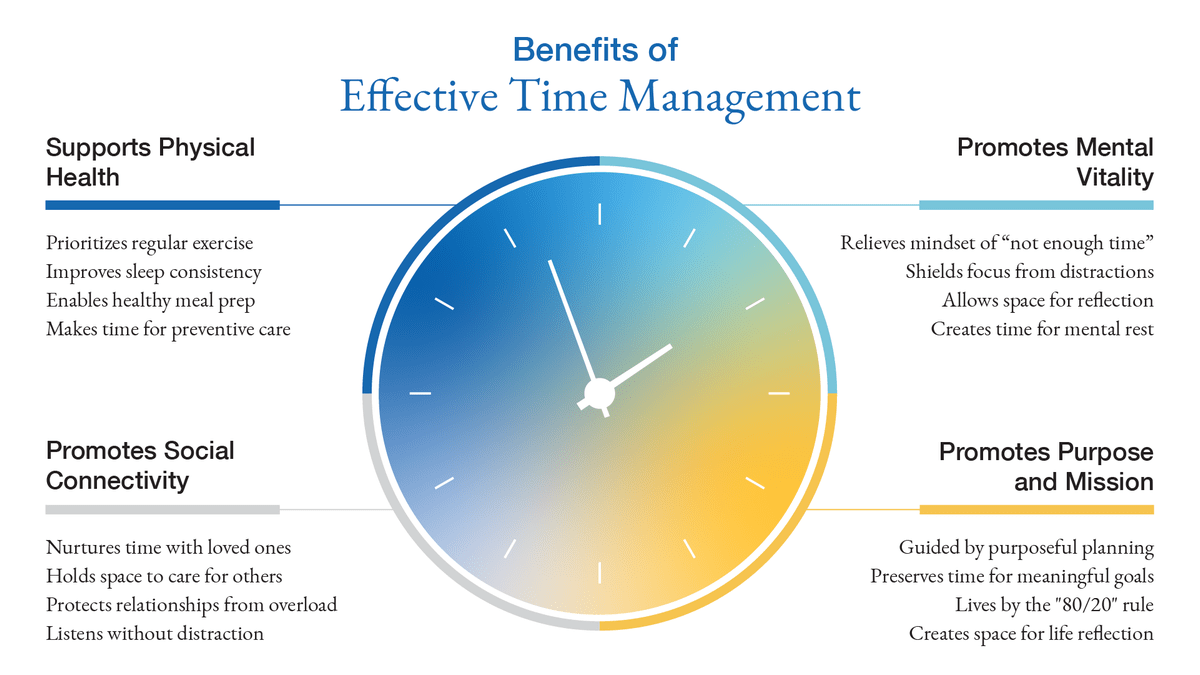Why Smarter Time Management Is a Foundation for Health and Well-Being
Is time management really related to your health? Absolutely—more than most people realize.
One of the most subtle yet powerful consequences of poor time management is the development of a time-pressed mindset—the persistent feeling that there’s never enough time to get everything done. While many people experience this occasionally, for some it becomes a chronic state that quietly undermines well-being across multiple domains.
Let’s take a closer look at how that plays out.
Impact on Physical Health
When we think about staying healthy, four core habits come to mind: regular exercise, strength training, nutritious meals, and consistent sleep. These habits are foundational to long-term health—but because they don’t feel urgent, they’re often the first to be dropped when time feels tight.
In productivity terms, they fall into what Stephen Covey called “Quadrant II” activities: important but not urgent.
The problem? The more overwhelmed we feel, the harder it becomes to invest in these proactive health behaviors. We rationalize that we’ll get to them “tomorrow”—but that tomorrow rarely arrives.
Impact on Mental Well-Being
The time-pressed mindset doesn’t just affect what we do—it reshapes how we think.
When we constantly feel behind, it becomes harder to pause, reflect, or make thoughtful decisions. We shift into survival mode, reacting to whatever feels most urgent. Over time, this narrows perspective, drains problem-solving ability, and erodes emotional resilience.
Ironically, the more overwhelmed we feel, the harder we push—deepening the cycle of urgency and stress. The result? Mental fatigue, irritability, self-criticism, and a growing disconnect from the activities that bring clarity and calm.
What makes this mindset so damaging is how quietly it becomes the norm. Over time, the sense of “I don’t have time” fades into our subconscious way of thinking, subtly coloring how we experience life.
Breaking the cycle requires more than a better schedule—it starts with awareness. You must first notice when you’re operating from a background mindset of time scarcity. Only then can you begin to reclaim time as something to be used with intention, not battled against.

Impact on Social Connection
Time management doesn’t just shape your routines—it shapes your relationships.
While social connection is a core human need, it rarely feels urgent in the moment. And without deliberate time investment, even our most meaningful relationships can drift into maintenance mode—or fade altogether.
Strong relationships aren’t built through quick check-ins. They require time to develop trust, share experiences, and foster understanding. When our days are too full, we default to shortcuts—texting instead of talking, canceling instead of showing up, staying surface-level instead of going deep.
Those shortcuts may feel efficient, but they come at a cost. Research shows that loneliness and weak social ties are associated with higher inflammation, increased risk of chronic illness, and shorter lifespans.
Time isn’t just a productivity tool—it’s a relationship tool. And how we spend it reveals what—and who—we prioritize.
Impact on Purpose and Meaning
Beneath even our need for connection lies a deeper drive: the desire to live with purpose. When people are anchored to a mission or long-term goal, they often willingly sacrifice comfort—or even social time—to pursue it.
What’s less often recognized is that a strong sense of purpose isn’t just inspiring—it’s protective for your health as well. Research links having a higher sense of life purpose to a lower risk of heart disease, slower cognitive decline, and greater longevity.
But when time feels scarce, pursuing our sense of life purpose is often the first casualty. Rather, we get swept into short-term demands—inbox zero, looming deadlines, quarterly metrics. These feel productive but can gradually displace our deeper aspirations: to grow, to contribute, to leave a legacy.
Stephen Covey called this “beginning with the end in mind”—not just the end of your week, but the end of your life. These long-term goals aren’t urgent, but they are defining.
In a culture of constant motion, staying connected to what truly matters requires deliberate pause. Without that space to reflect and recalibrate, we risk living efficiently—but not meaningfully.
Final Takeaway: Reclaim Time, Reclaim Health
Time management isn’t just about doing more—it’s about protecting what matters most.
When your time is mismanaged, the effects ripple across your life: your physical health deteriorates, your mind becomes overwhelmed, your relationships weaken, and your deepest goals slip out of reach. But when time is managed well, it becomes one of your most powerful tools for living with purpose, presence, and peace.
That’s why promoting health must include promoting smarter time management. In upcoming blogs, we’ll explore the practical building blocks of this skillset: how to prioritize effectively, create balance, harness the power of deadlines, lean on accountability partners, and structure your schedule in ways that reflect—not distort—your values.
Because time spent with intention doesn’t just move you forward in the moment—it protects and promotes well-being across the key domains that shape your health, vitality, and sense of purpose.



